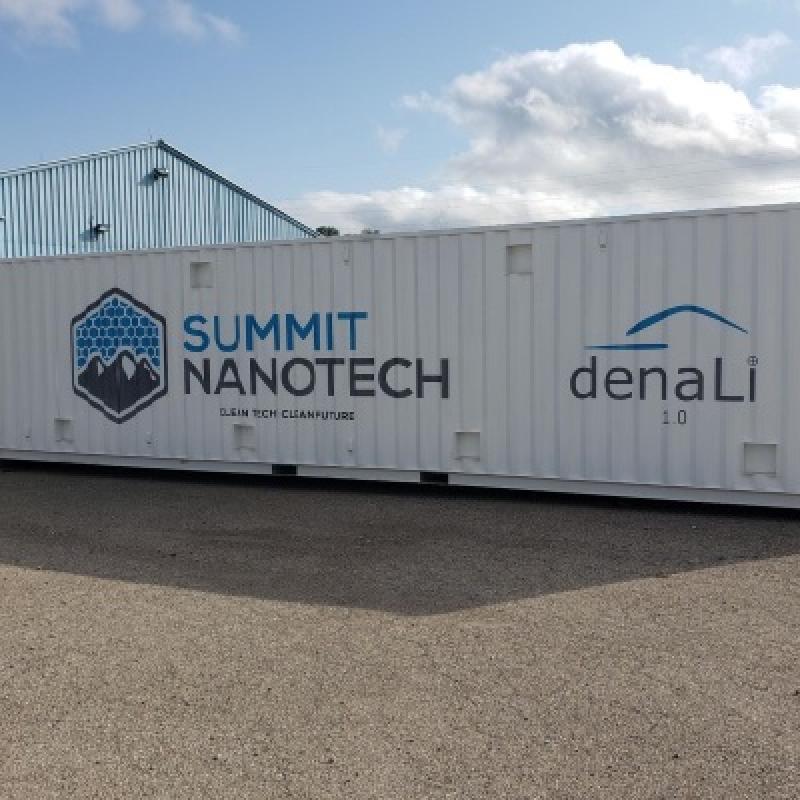
Calgary-based startup Summit Nanotech is pioneering a sustainable, advanced materials-based lithium extraction technique to meet rising demand for the metal in batteries and the clean energy sector.
The firm announced today a $67 million funding round co-led by Evok Innovations and Business Development Bank of Canada (BDC) Capital’s Climate Tech Fund, a sign of its potential as it runs a pilot project in Chile and looks to sate an increasing demand for critical minerals.
Unlike traditional lithium mining, which is environmentally destructive and water- and energy-intensive, Summit Nanotech draws out dissolved lithium from brine as an alternative to dynamiting hard rock and dissolving the debris with acid.
Amanda Hall, CEO and founder of Summit Nanotech, has a background in geophysics and 15 years of experience in resource extraction. The winner of the $1 million Women in Cleantech Challenge from MaRS hopes to play a key role in the future of energy by supporting the electric vehicle (EV) industry and reducing carbon dioxide emissions via sustainable lithium mining.
After four years of “head-down-in-labs” research and development and understanding the needs of its potential customers, Summit Nanotech is aspiring to develop a future-proofed technology to show mining companies “you can do an extraction process using advanced nanomaterials quickly, efficiently with low environmental impact and get a high-quality product and not suffer on economics.”
Summit Nanotech’s evaporation technique
The company’s direct lithium extraction process, patented as denaLi, involves filling a 40-foot sea-can container with raw salt water. Lithium-selective nanomaterial filters extract the battery-grade lithium carbonate using ion conductivity.
denaLi is novel for its speed, according to Hall. The traditional evaporation technique requires 18 months in giant evaporation ponds. Summit Nanotech claims to accomplish this in five hours with 26 times less surface land use. The low temperature and pressure in the process means it is energy efficient and minimizes greenhouse gas emissions.
It extracts lithium first, unlike the traditional brine evaporation technique that removes other minerals like calcium and magnesium first. denaLi leaves the impurities in the brine, which Hall said reduces waste by over 90 per cent and lowers operating expenses.
She claimed it doubles yields compared to the traditional evaporation technique.
The Chile pilot and water sustainability
The technology is being piloted in Chile. The Andean country is considered ideal for the evaporation technique, but fresh water is scarce.
Hall said Summit Nanotech's method "dramatically" cuts water use. "That is really important because the local communities rely on this water for drinking water," she added.
It reinjects the brine back underground, which maintains subsurface pressure that retains the pore space underground. This prevents subsidence (ground shrinking) or migration of drinking water tables into empty pore space, which happens with existing evaporation techniques.
The pilot generated one ton of lithium per year from 1,000 litres of brine per day, according to Hall — around three kilograms per day. The next step is to expand production to extract up to 100 tons of lithium per year.
The latest funding round
The $67 million raised in its Series A2 funding round will assist Summit Nanotech in scaling its Canadian manufacturing capabilities and expanding globally.
Naynika Chaubey, a partner at Evok Innovations, said critical minerals such as lithium and the energy transition sector are core to its thesis.
Lithium is necessary not just for EVs, Chaubey said, but for utility-scale energy storage so predictable, steady-state renewable energy grids are possible.
She said Summit Nanotech shortens the time needed for evaporation-based lithium extraction, and "time is of the essence when it comes to lithium delivery by the end of this decade . . . In addition to the grit and talent of the founding team here, we also really liked the technology.”
The Climate Tech Fund is a $400 million initiative by the BDC to promote climate tech solutions and technology – like lithium batteries – that enable greenhouse gas mitigation.
“We’re excited about this space in general. The demand for electric vehicles which require lithium batteries is far outpacing the supply chain," Cheri Corbett, senior partner in the BDC's Climate Tech Fund, said in a statement. "So lithium supply will need to grow 20 times by 2050. So this kind of technology, especially one that is so environmentally friendly . . . it checks many boxes.”
Summit Nanotech has now raised a total of $96 million.
What’s next for Summit Nanotech
Summit Nanotech started with 15 employees in 2022 and now has 70. The expectation is to exceed 100 workers this year.
One of the company’s goals “is to keep a domestic supply chain of battery metals,” Hall said, referencing the Canadian government’s Critical Minerals Strategy. This entails cutting dependency on countries like China and Russia to stay as “close to home as possible.”
Hall said the company’s technology is viable in North America if scaled up for lithium salt water deposits in the U.S. and Canada. It is also developing a clay lithium extraction method in Nevada that converts the lithium into lithium hydroxide. Hall said this can tap into the funding from the Inflation Reduction Act.
It is beginning discussions with off-takers for its lithium, such as EV battery manufacturers, but it still has to acquire enough lithium, ensure the quality is up to snuff and establish a supply chain as it scales up its technology and presence.
Editor's note: Cheri Corbett's name is corrected.










